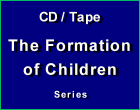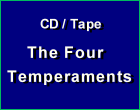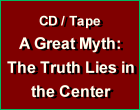Ecology
 |
 |
 |
 |
 |
 |
 |
UNESCO’s Rights of Animals – IV
A Revolutionary Revolt against Pain
Motivates Today’s Over-Protection of Animals
In the last articles (here, here and here), we have commented on the statements in UNESCO’s Universal Declaration of the Rights of Animals and its revolutionary presupposition that every animal has rights equal to those of men. Today we continue with the analysis of the following line in that Declaration:
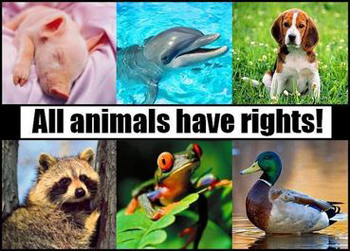 Every animal which is dependent of man and lives in the environment of man has the right to live and grow in the patterns, conditions of life and freedom proper to its species.
Every animal which is dependent of man and lives in the environment of man has the right to live and grow in the patterns, conditions of life and freedom proper to its species.
So, supposing one of us has an animal and wants to get rid of it; he takes it to some faraway place and lets it go free. Now, he cannot do this because the animal is accustomed to the man’s house, his environment. This is tantamount to enacting labor laws for animals as they exist for workers. For the worker it is fine, but for an animal it makes no sense.
Imagine an old lady with a son who owns an enormous dog. She is poor, the son dies and she has to take care of that huge beast. She lacks the strength to wash the dog and the money for the soap; further, she is afraid the dog will bite her. Normally speaking, she would open the door and let the dog go. Now, she cannot do it because the dog is accustomed to her house.
You can see that we are heading toward the creation of a municipal deposit for unwanted pets, where the lady is required to bring her dog. But, then, it is the tax-payer citizen who has to sponsor this enterprise to give dogs proper sustenance and care. Consequently, there will be less bread for the family hearth so that the city can have properly housed dogs, because the dog has its rights.
Another aspect to consider: If every single animal has rights and deserves to remain in its proper environment, there is the matter of lice, which also have rights. So, if a man has lice, he cannot take a shower and expel them from his hair, because they have rights. If this madness goes forward, it can reach the point where a man will have to open a court process to ask permission to take a shower and rid him of the lice infesting his hair; otherwise he will commit the crime of drowning those poor lice.
If you were a senator or representative of your city, you would be ashamed to present such a law because you would correctly fear that the whole country would guffaw at your foolishness. And inevitably they would.
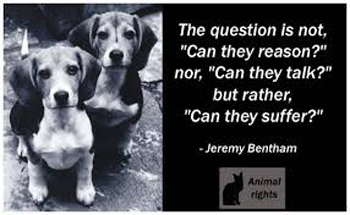 However, there have been no guffaws about this Declaration. It was approved without clamor and is starting to be applied. This is the preparatory phase that has begun to force its acceptance. Try to criticize this document in your circles of friends or relatives. You will see that very few persons support you.
However, there have been no guffaws about this Declaration. It was approved without clamor and is starting to be applied. This is the preparatory phase that has begun to force its acceptance. Try to criticize this document in your circles of friends or relatives. You will see that very few persons support you.
Most likely, you will be considered as insensitive and cold. Some ladies will say: “Poor little canary; he wants it to be imprisoned because he is an egoist.” If you say: “But God made the canary for man to listen to his songs,” they will reply: “No, God made the canary to be free. You are torturing the canary unjustly.”
The same opposition Catholics encountered when they criticized the theses of the French Revolution, you will find now should you will oppose this UNESCO Declaration.
This transformation is something phenomenal. When I wrote the book Revolution and Counter-Revolution, I thought about including animal rights in it as a final step of the process of egalitarianism, but I decided not to mention it because people would say that I was exaggerating. They would have said, then, that we could never take this step.
Now, we are two feet inside the process that, then, looked like a ludicrous exaggeration. It became a fact. What was considered an absurdity some years ago now is being proclaimed by UNESCO and it is being noiselessly accepted by everyone. Many, now, consider its tenets as common sense wisdom and accuse anyone who disagrees with it of being a criminal.
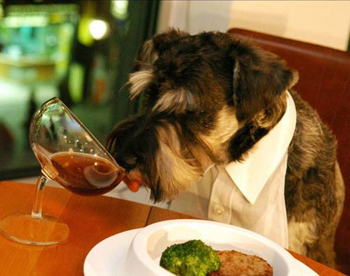 This is the difference that is being established between them and us. The world of the Revolution is moving far and fast.
This is the difference that is being established between them and us. The world of the Revolution is moving far and fast.
Recently, I have even seen advertisements of hotels and cemeteries for animals in São Paulo. So, this new mentality sees nothing wrong with taking an unborn baby and throwing him into the garbage bin or having his dead body sent to a factory to be transformed into cosmetic products, but to kill an animal is considered a crime.
These are aberrations of an epoch that is in a state of frenzy with its raving sins against God. It is madness.
Question: How did you come to realize the importance of this Declaration?
Dr. Plinio: The mentality behind modern sociology and philosophy is based on a revolt, an inconformity with and a horror for pain. Anything involving pain causes them real horror. Thus, after fighting – through medicine and birth control – against pain with all their resources, now they turn their revolt toward pain in animals. They want animals to be free in order to not suffer any pain from man.
It is the application to animals of the famous slogan of the Sorbonne: “It is forbidden to forbid.” And the man who applies this principle to animals makes it forbidden to forbid animals anything – another contradiction.
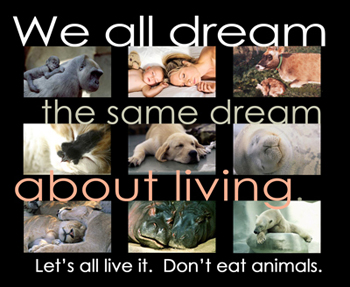 On one hand, it is anarchy where there should be order; on the other hand, it is tyranny where there should be liberty. In the future man will live in anarchy, because there will be no proper laws, but rather a tyrannical philosophic conviction will prevent him from nourishing himself with the flesh of animals.
On one hand, it is anarchy where there should be order; on the other hand, it is tyranny where there should be liberty. In the future man will live in anarchy, because there will be no proper laws, but rather a tyrannical philosophic conviction will prevent him from nourishing himself with the flesh of animals.
I realized that this revolt against pain had inspired many poets, authors and sentimental persons who expressed a pity for animals that formerly was reserved for men. I have seen, for example, ladies pitying a bird in a cage as if it were a person in a prison. As if the bird were capable of having feelings like a man. It is because the lady in her revolt against pain attributed to the bird something that it does not have, considering it to be like a man.
This does not mean that we should inflict needless pain on animals. I should treat an animal kindly and prevent it from suffering pain not because I consider the bird to be a child, but because everything that was created by God must be conserved in the good order He created. It was this mentality, which I observed in many persons, that made me suspicious the Revolution would take this step in the future.
Note 1: These comments were made on November 8, 1978, shortly after the UNESCO issued its first Declaration. The Declaration available in 2017 suffered several changes, which are not addressed in this series.
 Continued
Continued


This equality of animals is proclaimed today boldly by ever-growing 'animal rights movements'
So, supposing one of us has an animal and wants to get rid of it; he takes it to some faraway place and lets it go free. Now, he cannot do this because the animal is accustomed to the man’s house, his environment. This is tantamount to enacting labor laws for animals as they exist for workers. For the worker it is fine, but for an animal it makes no sense.
Imagine an old lady with a son who owns an enormous dog. She is poor, the son dies and she has to take care of that huge beast. She lacks the strength to wash the dog and the money for the soap; further, she is afraid the dog will bite her. Normally speaking, she would open the door and let the dog go. Now, she cannot do it because the dog is accustomed to her house.
You can see that we are heading toward the creation of a municipal deposit for unwanted pets, where the lady is required to bring her dog. But, then, it is the tax-payer citizen who has to sponsor this enterprise to give dogs proper sustenance and care. Consequently, there will be less bread for the family hearth so that the city can have properly housed dogs, because the dog has its rights.
Another aspect to consider: If every single animal has rights and deserves to remain in its proper environment, there is the matter of lice, which also have rights. So, if a man has lice, he cannot take a shower and expel them from his hair, because they have rights. If this madness goes forward, it can reach the point where a man will have to open a court process to ask permission to take a shower and rid him of the lice infesting his hair; otherwise he will commit the crime of drowning those poor lice.
If you were a senator or representative of your city, you would be ashamed to present such a law because you would correctly fear that the whole country would guffaw at your foolishness. And inevitably they would.

Animal rights' advocates base their argument on the animal's supposed capacity to suffer like man
Most likely, you will be considered as insensitive and cold. Some ladies will say: “Poor little canary; he wants it to be imprisoned because he is an egoist.” If you say: “But God made the canary for man to listen to his songs,” they will reply: “No, God made the canary to be free. You are torturing the canary unjustly.”
The same opposition Catholics encountered when they criticized the theses of the French Revolution, you will find now should you will oppose this UNESCO Declaration.
This transformation is something phenomenal. When I wrote the book Revolution and Counter-Revolution, I thought about including animal rights in it as a final step of the process of egalitarianism, but I decided not to mention it because people would say that I was exaggerating. They would have said, then, that we could never take this step.
Now, we are two feet inside the process that, then, looked like a ludicrous exaggeration. It became a fact. What was considered an absurdity some years ago now is being proclaimed by UNESCO and it is being noiselessly accepted by everyone. Many, now, consider its tenets as common sense wisdom and accuse anyone who disagrees with it of being a criminal.

A restaurant in London, Bluebird, serves a three course gourmet meal for dogs
Recently, I have even seen advertisements of hotels and cemeteries for animals in São Paulo. So, this new mentality sees nothing wrong with taking an unborn baby and throwing him into the garbage bin or having his dead body sent to a factory to be transformed into cosmetic products, but to kill an animal is considered a crime.
These are aberrations of an epoch that is in a state of frenzy with its raving sins against God. It is madness.
Question: How did you come to realize the importance of this Declaration?
Dr. Plinio: The mentality behind modern sociology and philosophy is based on a revolt, an inconformity with and a horror for pain. Anything involving pain causes them real horror. Thus, after fighting – through medicine and birth control – against pain with all their resources, now they turn their revolt toward pain in animals. They want animals to be free in order to not suffer any pain from man.
It is the application to animals of the famous slogan of the Sorbonne: “It is forbidden to forbid.” And the man who applies this principle to animals makes it forbidden to forbid animals anything – another contradiction.

The movement ultimately demands that man stops eating animals...
I realized that this revolt against pain had inspired many poets, authors and sentimental persons who expressed a pity for animals that formerly was reserved for men. I have seen, for example, ladies pitying a bird in a cage as if it were a person in a prison. As if the bird were capable of having feelings like a man. It is because the lady in her revolt against pain attributed to the bird something that it does not have, considering it to be like a man.
This does not mean that we should inflict needless pain on animals. I should treat an animal kindly and prevent it from suffering pain not because I consider the bird to be a child, but because everything that was created by God must be conserved in the good order He created. It was this mentality, which I observed in many persons, that made me suspicious the Revolution would take this step in the future.
Note 1: These comments were made on November 8, 1978, shortly after the UNESCO issued its first Declaration. The Declaration available in 2017 suffered several changes, which are not addressed in this series.

Australian philanthropist Peter Wollen heads various popular movements that call for radically equal rights for animals

Posted February 13, 2017
______________________
______________________






